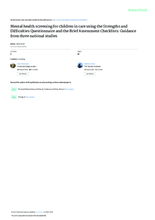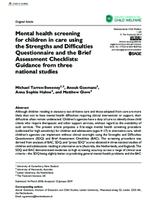Displaying 951 - 960 of 2221
Drawing on national-level data from the United States' child protection system, this study examines the prevalence of substantiated child protection cases involving a parent with an intellectual disability as well as information about demographic characteristics, risk factors, child maltreatment types and services provided at the start of a child protection case.
The current study examined longitudinal trajectories of memory and executive functioning (EF) from childhood to adolescence in the Bucharest Early Intervention Project, a randomized controlled trial of foster care for institutionally reared children in Romania.
The purpose of the current article is to highlight the need for greater attention to foster parent self-care and integrate the research literature about foster parent stressors and self-care to propose a conceptual model of foster parent self-care.
The present article proposes a first-stage mental health screening procedure (calibrated for high sensitivity) for children and adolescents (ages 4–17) in alternative care, which children’s agencies can implement without clinical oversight using the Strengths and Difficulties Questionnaire (SDQ) and Brief Assessment Checklists (BAC).
The present article proposes a first-stage mental health screening procedure (calibrated for high sensitivity) for children and adolescents (ages 4–17) in alternative care, which children’s agencies can implement without clinical oversight using the Strengths and Difficulties Questionnaire (SDQ) and Brief Assessment Checklists (BAC).
The current study explores how historical trauma has impacted American Indian tribes' trust in today's US public child welfare agencies.
This comprehensive literature review adds to the knowledge of pregnant and parenting mothers in foster care and their children by identifying and summarizing all relevant studies published between 2011 and 2017.
To inform decisions about permanent care arrangements, the authors of this study used Swedish national population registers to create a sibling population consisting of 194 children born 1973–1982 who had been in out-of-home care (OHC) at least 5 years before adolescence but were never adopted (50% boys) and their 177 maternal birth siblings who also had been in OHC at least 5 years before their teens but were adopted before adolescence (52.5% boys).
The present study describes a community implementation of treatment foster care (TFC) for children and youth involved with child welfare in Ontario, Canada.
This study presents the feasibility and pilot evaluation of the Reflective Fostering Programme (RFP), a recently developed, group-based program to support foster carers, based on the concept of “reflective parenting.”


